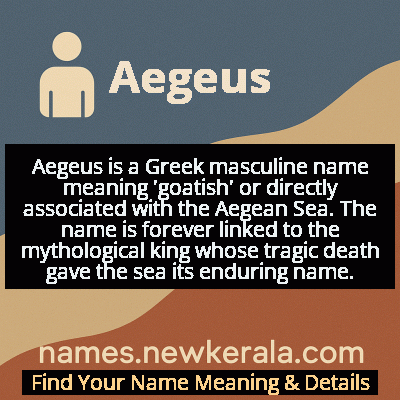Aegeus Name Meaning & Details
Origin, Popularity, Numerology Analysis & Name Meaning of Aegeus
Discover the origin, meaning, and cultural significance of the name AEGEUS. Delve into its historical roots and explore the lasting impact it has had on communities and traditions.
Name
Aegeus
Gender
Male
Origin
Greek
Lucky Number
4
Meaning of the Name - Aegeus
Aegeus is a Greek masculine name meaning 'goatish' or directly associated with the Aegean Sea. The name is forever linked to the mythological king whose tragic death gave the sea its enduring name.
Aegeus - Complete Numerology Analysis
Your Numerology Number
Based on Pythagorean Numerology System
Ruling Planet
Uranus (Rahu)
Positive Nature
Strong sense of order, loyal, practical, and disciplined.
Negative Traits
Stubborn, overly serious, rigid, and prone to feeling restricted.
Lucky Colours
Blue, gray.
Lucky Days
Saturday.
Lucky Stones
Blue sapphire.
Harmony Numbers
1, 7, 8.
Best Suited Professions
Managers, engineers, accountants, organizers.
What People Like About You
Dependability, discipline, practicality.
Famous People Named Aegeus
Aegeus of Athens
Mythological King
Legendary king of Athens, father of Theseus, gave his name to the Aegean Sea
Aegeus (character)
Literary Figure
Prominent figure in Euripides' 'Medea' and other Greek tragedies
Aegeus (historical reference)
Mythological Ruler
Central figure in the myth of Theseus and the Minotaur
Name Variations & International Equivalents
Click on blue names to explore their detailed meanings. Gray names with will be available soon.
Cultural & Historical Significance
Extended Personality Analysis
The mythological Aegeus presents as a ruler defined by his profound emotional depth and the tension between his public role and private vulnerabilities. His character arc reveals a man of considerable political acumen who nonetheless struggles with personal insecurities, particularly regarding succession and legacy. The central tragedy of his life—his suicide upon misinterpreting his son's sailing signals—underscores a personality prone to catastrophic assumptions born of deep emotional investment. This combination of royal authority with very human frailties makes him one of Greek mythology's more psychologically complex male figures. His relationships, particularly with Medea and Theseus, demonstrate a pattern of seeking connection while maintaining the emotional distance required by kingship, creating a portrait of a leader constantly navigating the divide between his heart and his crown.
Modern Usage & Popularity
In contemporary naming practices, Aegeus remains an extraordinarily rare choice, primarily confined to academic families, classical scholars, and those with specific connections to Greek heritage or mythology. The name's archaic quality and association with tragic mythology limit its mainstream appeal, though it occasionally appears in literary contexts or among parents seeking distinctive classical names. Its usage patterns show no significant trends in birth registries worldwide, maintaining its status as a scholarly or symbolic choice rather than a practical given name. The name's complexity and dark mythological associations ensure it remains a niche selection, appreciated more for its historical weight than its suitability for modern life.
Symbolic & Spiritual Meanings
Aegeus symbolizes the profound intersection of personal emotion and collective geography, representing how individual tragedy can become permanently etched into cultural landscapes. Metaphorically, he embodies the costs of miscommunication and the weight of paternal love, serving as an eternal reminder of how assumptions can lead to irreversible consequences. The sea that bears his name carries his symbolic legacy—both as a connector of civilizations and as a site of personal devastation. His story represents the ancient Greek understanding of how human emotions shape physical reality in cultural memory, creating enduring symbols from transient human experiences.

